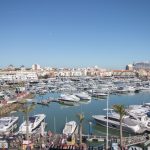Portugal’s banks – as good as gold?
In April 2020 the unthinkable happened. During the peak of the Coronavirus pandemic, Portugal’s normally mild, affable and non-confrontational President Marcelo Rebelo de Sousa did something astonishing.
He summoned the presidents of Portugal’s main banks to the presidential palace and in no uncertain terms told the bankers that they had a responsibility towards economic recovery and told them it was now time to repay the tax payers for the help they had given the sector over the past decade.
Everyone in Portugal knew the president was referring to the many hundreds millions of public money that had been used to bail out Portugal’s banking system after a catalogue of reckless lending, casino-like banking and mismanagement which, when the financial crisis took hold from 2008 onwards, revealed just how close the entire banking system in Portugal was to collapse.
Today, in the wake of the Coronavirus pandemic it seems increasingly likely that Portugal, in common with most Euro Zone countries will face at best a recession similar to that of 2007-2014 and at worst, the Great Depression of the 1930s.
The European Central Bank (ECB), the Bank of Portugal (BdP) and Portugal’s Minister of Finance, Mário Centeno, current president of the EU’s group of finance ministers Eurogroup, all agree that Portugal’s banks are, despite some lingering systemic weaknesses, are in a better shape to deal with an external shock such as the current one provoked by the Covid-19 pandemic.
Even so, Portugal’s central bank in line with the ECB admits that some banks in Portugal may fail to reach their targets.
The Portuguese banking system was particularly hard-hit by that crisis, both for external and internal reasons, with a number of banks failing not just because they lacked liquidity, but rather because they had made so many high-risk and ill-judged investments, they had ended up with a crop of toxic debts on their books which made them generally unsound.
In the wake of that crisis a number of Portuguese banks either disappeared or ended up seriously undercapitalised. The result was that the Portuguese State had to step in and rescue them. From 2008 to 2016 it spent an estimated €14Bn of public money on shoring up the banks, with much of this money written off.
The overall losses at the time according to the Court of Auditors and National Statistics Institute represented nearly 8% of Portugal’s GDP and led to the ratings agency Moody’s warning that the Portuguese banking system was one of the most vulnerable in Europe.
The first bank to collapse in 2008 was the Banco Português de Negócios (BPN) which had to be nationalised to prevent €1.8Bn of losses affecting the financial sector. The president of the bank, José Oliveira e Cost who had run the institution since 1997 ended up being arrested on suspected tax fraud, money laundering, forgery, abuse of credit and illegal gains.
The bank was sold to the Angolan Banco BIC for just €40 million in 2014 leaving the tax payer out of pocket by an estimated €3.2Bn. That bank in turn, more recently headed by the former finance minister of the discredited Socialist government of José Sócrates, Fernando Teixeira dos Santos, was again plastered all over the national press for the wrong reasons.
In 2019 it emerged that its main shareholder, Isabel dos Santos, with 42.5%, may have bought her shareholding with dirty money allegedly stolen from the Angolan State.
On 19 January 2020 the International Consortium of Investigative Journalists (ICIJ) published a detailed report on how dos Santos had amassed her wealth over the years. The report, called Luanda Leaks, provides evidence of how she made a fortune at the expense of the Angolan people and then used that money to buy a considerable share in Banco BIC.
When the scandal blew up, Nuno Ribeiro da Cunha, her private financial manager and director of Private Banking at EuroBic (the bank’s name had been changed from Banco BIC to EuroBic in 2017) was found dead at his home in January after taking his own life.
In 2009 the Banco Privado Português (BPP) failed and was wound up after the Portuguese Government refused to bail it out after it emerged that the bank was associated with crimes of falsification of accounts and money laundering.
In July 2009, former BPP board members Paulo Guichard and Salvador Fezas Vital were suspended by the Bank of Portugal while Jõao Rendeiro was charged with falsifying accounts, tax crimes and money laundering.
Nevertheless, by the time the bank collapsed, the Government had already stood guarantor to considerable monies and the tax payer was once again saddled with €650 million in debts.
The fall of BES
In 2014 the country’s most respected high-street bank Banco Espírito Santo collapsed when it was discovered that the bank had whitewashed its balance sheets to cover up losses of around €3.5Bn.
The Governor of the Bank of Portugal, Carlos Costa, gave reassurances that BES, run by Ricardo Salgado famously nicknamed ‘Mr. I own the whole lot’ was a safe as houses. His words were that it was “sound, robust, solvent and quite a wonderful business”.
From the ashes of BES emerged Novo Banco, created by the Bank of Portugal using BES’s good assets. The Portuguese State and the other banks through a Resolution Fund initially Injected €4.9Bn to recapitalise the bank.
The new bank, however has continued to lose money. First, under the leadership of Vítor Bento who resigned after realising that the bank, if sold, would lose the State billions of euros. Then came Eduardo Stock da Cunha who quickly went.
The Resolution Fund was the bank’s only shareholder until 2015 when the Government received three binding offers from the Spanish banking group Banco Santander SA, the Chinese insurance group Fosun International Limited the privately owned Chinese insurer Anbang Insurance and the American private equity firm Apollo Global Management. However attempts to sell the bank were hampered by low bids with the Government reaching the conclusion that the offers were unsatisfactory.
In 2016 the Resolution Fund received a new crop of offers from China’s Minsheng Financial Holding, Apollo, Centerbirdge and Lone Star. Early the following year Aethel partners made a bid.
But it wasn’t until March 2017 that the Portuguese Central Bank announced that a vulture fund Lone Star Funds would acquire 75% of Novo Banco in return for a capital injection of €1Bn with the other 25% held by the Resolution Fund.
More recently, the bank under the leadership of António Ramalho, has continued to improve despite still having one of the worst single evaluations from the European Central Bank of any of Portugal’s banks.
For the second year on the trot, the ECB has relaxed its capital ratio regulations for Novo Banco. Nevertheless,
Shipshape with a few leaks
Nevertheless, despite the crop of scandals and plain mismanagement over the past decade, Portugal’s banking system has made a remarkable recovery since the global financial and sovereign debt crisis.
In the post crisis period the regulatory and supervisory framework was considerably reformed and banks in Portugal, like elsewhere in Europe, underwent significant changes and restructuring. The result is that, with few exceptions, banks balances are of a better quality and they have deleveraged which has led to higher levels of liquidity.
In Portugal’s case this meant reducing Non-Performing Loans (NPL) and clearing both commercial and residential property portfolios accumulated because of defaults off their books through auctions, roadshows or selling them on to real estate asset management companies.
The core capital at Portugal’s banks is more robust which means a greater capacity to withstand shocks, at least they were before the Covid-19 crisis and shutdown of international commerce and trade.
Another big improvement in the system was structural in terms of a shakeup at a shareholder level.
In the past, both before and after the 1974 Revolution, private banks in Portugal were largely held by companies owned by entrepreneurs and powerful families. There are no longer today any banks in private individual or family hands. Some, like Banco Espírito Santo no longer exist, at least as they were, while others are owned by shareholders while the capital in the larger banks is controlled by international financial organisations.
And in terms of how they are run, Portugal’s banks are more efficient and profitable, and even Novo Banco, which is over €1Bn in the red, would actually be nearly €180Bn in profit if it weren’t for the toxic assets and bad loans it had inherited from BES. That said, the profitability of Portugal’s banks are still below capital costs.
Risk management practices have been reined in, greater due diligence is being exercised and with the current Governor of the Bank of Portugal, Carlos Costa’s term in office coming to an end, likely to be replaced by Portugal’s current thrifty and prudent finance minister Mário Centeno, so too should banking supervision.
Other areas too, such as Anti-Money Laundering (AML) – this didn’t work so well with EuroBic – compliance, auditing, digital security, data treatment and protection have all developed significantly.
Technological innovation, in particular digital, has revolutionised many day-to-day bank operations to the benefit of customers and operational efficiency and after the Covid-19 crisis when whole swathes of the older Portuguese population, hitherto still preferring to pop into their banks to conduct their business transactions face-to-face, this revolution in laptop and mobile banking is likely to accelerate and become widespread.
In fact, during the Covid-19 crisis Portugal’s banks such as Millennium bcp and Novo Banco have even run online campaigns showing teenagers helping their elderly grandparents get to grips with home banking applications.
The big challenges
Portugals banks, in line with moist others in Europe face a mountain of challenges not made easier by the current Covid-19 pandemic.
For starters, financial margins are being eroded making the traditional banking model increasingly unsustainable because of current monetary policy.
The emergence of dynamic and technologically driven no-frills branchless banks with little or no overheads such as Revolut, Lydia, Monese, N26, WiZink, Open Bank and Banco Best have all put pressure on traditional banks hampered by the costs of supporting nationwide branches and a higher workforce.
Regaining trust
Despite this technological banking revolution in Portugal and a return to more traditional banking values when it comes to lending, the sector has yet to recover the trust of the general public in its financial institutions.
For many ordinary citizens in the streets, banking in Portugal is still synonymous with the cronyism, corruption and incompetence which has tarnished the image of the sector as a whole, including, unfairly, those banks which were not involved in the series of scandals which had taken place nearly a decade earlier.
And the televised parliamentary enquiry into what went wrong with Portugal’s banks, with a stream of senior banking and supervisory figures saying they knew nothing, including the cynical sneering of a maverick art collecting entrepreneur during hearings, only reinforced that image and public distrust.
At the end of the day, as a result of both internal decadence and external shocks, Portugal’s banking sector is more robust, transparent and better managed that it has been for over 20 years. It is just a shame that it took a major world economic crisis and a loss of reputation and public confidence for it to make that change.










